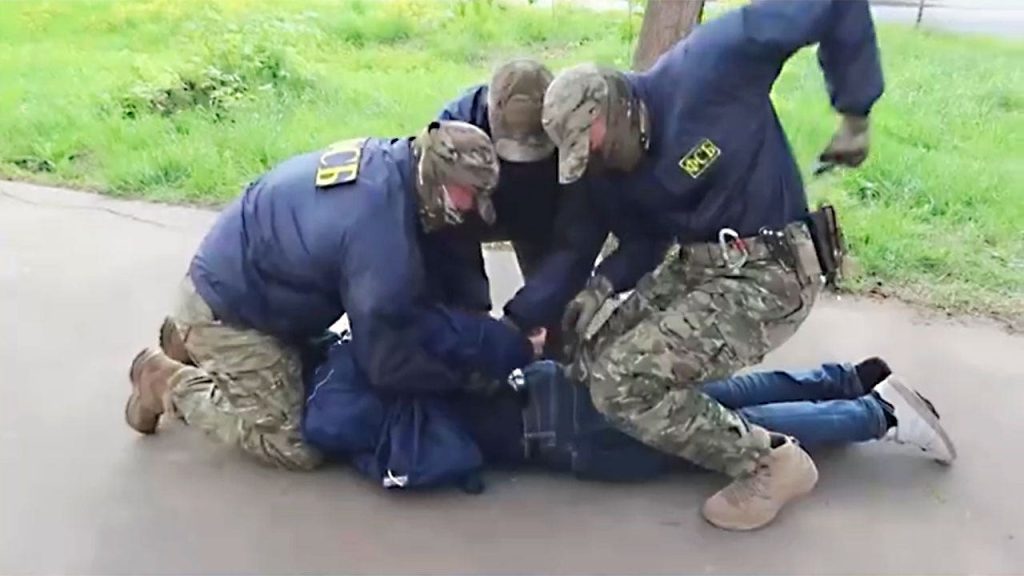Russian Developer Sentenced to 15 Years for $500 Ukrainian Donation
In a chilling demonstration of the Putin regime’s intolerance for dissent, 45-year-old Russian software developer Sergei Irin has been sentenced to 15 years of hard labor in a maximum-security prison. His crime? Donating approximately $500 to a Ukrainian defense fund just days after Russia’s invasion of Ukraine began. The case highlights the increasingly severe consequences facing Russians who dare to express opposition to the war or support for Ukraine, revealing the lengths to which the Kremlin will go to silence dissent within its borders.
Irin, who previously worked for Russian tech giant Yandex, showed remarkable defiance during his sentencing, refusing to stand in court and holding up a sign with an expletive-laden insult directed at President Putin. This final act of resistance came after what appears to have been a harrowing ordeal beginning with his arrest. According to footage obtained by Fox News Digital, masked police officers tackled and handcuffed Irin, who had previously fled Russia but had returned to visit his mother. The video shows Irin being questioned in a van, where he admitted to donating funds to Ukraine’s “Come Back Alive” charity on February 27, 2022 – just three days after Russia launched its invasion. The organization supports Ukraine’s defense forces, and in Putin’s Russia, such support has been criminalized as treason.
The severity of Irin’s treatment speaks volumes about the Russian state’s determination to crush any form of opposition. Reports from East2West suggest that following his arrest, Irin was “interrogated with a stun gun” before being transported to Moscow’s notorious Lefortovo pre-trial detention center. This facility has a dark history dating back to Soviet times, known for housing political prisoners and those accused of crimes against the state. In addition to his prison sentence, Irin was also fined approximately $62,000, adding financial punishment to his already crushing sentence. The court documents do not clarify whether his defiant courtroom gesture with the sign influenced the severity of his sentence, or if the punishment was solely for his financial support of Ukraine.
Irin’s case is far from isolated. It represents a broader pattern of intensifying repression in Russia, where any expression of support for Ukraine or criticism of the “special military operation” can lead to severe consequences. Since the invasion began, Russian authorities have enacted increasingly draconian laws criminalizing “fake news” about the military – effectively outlawing any narrative that contradicts official state propaganda. Thousands of Russians have been detained for anti-war protests, and many, like Irin, have faced serious criminal charges. During his interrogation, Irin admitted to feeling “negatively” toward the Putin regime and acknowledged participating in opposition rallies – statements that would have further marked him as an enemy of the state in the eyes of Russian authorities.
The harsh punishment for what many outside Russia would view as a modest donation – approximately $500 – serves a clear purpose: to instill fear in other Russians who might consider supporting Ukraine or opposing the war. It sends a message that no act of dissent, regardless of how small, will be tolerated. This case also illustrates the dangers facing Russian citizens who have fled the country but later return, even briefly. Many Russians opposed to the war left the country following the invasion, creating a significant brain drain as tech workers, journalists, and other professionals sought safety abroad. Irin’s arrest during what was reportedly a visit to his mother suggests that returnees face significant risks, regardless of their reasons for coming back.
As Irin begins his 15-year sentence in an as-yet-unspecified maximum-security prison, his case stands as a stark reminder of the human cost of authoritarianism and the courage of those who refuse to remain silent in the face of injustice. While the international community continues to impose sanctions on Russia for its actions in Ukraine, cases like Irin’s highlight another dimension of the conflict – the internal war being waged by the Russian state against its own citizens who dare to question the official narrative. For every Sergei Irin whose case becomes known to the outside world, there are likely many others suffering similar fates away from the international spotlight, their stories untold as Russia continues its crackdown on dissent with increasing ferocity.















